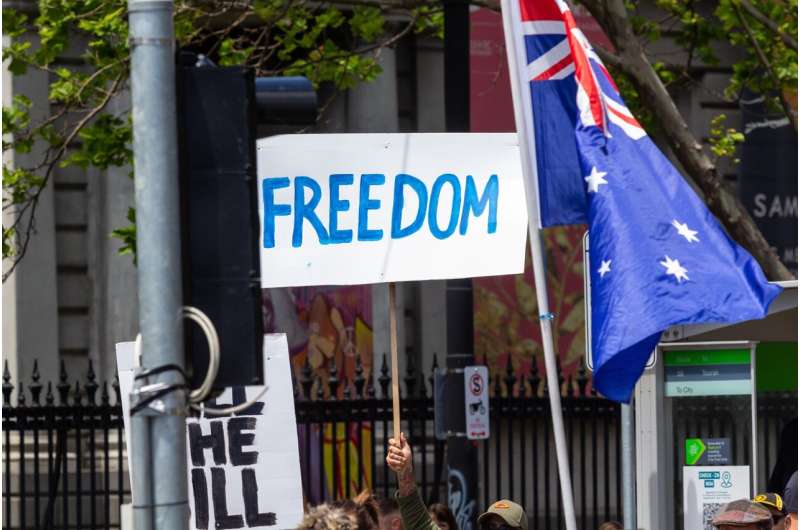Credit: Unsplash/CC0 Public Domain
For those watching the news, anti-vaccination movements seem to be evolving, with both new tactics and a new watchword—liberty, rather than conspiracy.
As 2021 neared its end, protests against mandatory COVID vaccination policies spread across Europe. In city centers, placards and their holders shouted "freedom" and asserted the right, as one sign expressed it, to "use your own judgment". Then, earlier this year, the "Freedom Convoy," funded in part by donations from American citizens, brought the Canadian capital and border crossings to a standstill. Similar trucker protests appeared in France and the U.S.
But though this wave of resistance seems to find unity in a shared rhetoric of state overreach and personal freedoms, the wider population of vaccine resisters may not actually share much in common with it. History shows that in the context of anti-vaccination, the rhetoric of liberty can gloss a more varied set of concerns, obscuring as much as it enlightens.
Consider Jacobson v Massachusetts, a famous U.S. Supreme Court decision in American public health history, viewed today as one of the key expressions in the debate over government vaccine mandates. In 1902, a wave of smallpox compelled the Board of Health in Cambridge, Massachusetts, to declare vaccination for the disease mandatory. Door-to-door vaccinators knocking at the home of 46-year-old Henning Jacobson, however, were rebuffed. Both Jacobson and his son refused the jab.
The penalty was a $5 fine, a sizeable sum in 1902. Jacobson refused to pay, with his lawyer arguing that the plaintiff's right to choose what was best for his own body trumped the state's right to force him to get vaccinated. The Massachusetts Anti-Compulsory Vaccination League took an interest in Jacobson's case, funding it through its many successive iterations all the way to the Supreme Court. In 1905, the matter was decided in the state's favor. The responsibility of a government to protect the public's health, the court found, superseded the liberty of any single individual.
But though his lawyers presented the courts with a dizzying array of arguments, from personal freedom to the supposed pagan basis of vaccination, Jacobson himself was no zealot. His refusal of this vaccine was not about principle. Instead, it was his experience of the painful and worrying side-effects that both he and his son had experienced from earlier smallpox vaccinations.
Adverse side-effects associated with the smallpox vaccine were not uncommon, and especially given the unregulated and shoddy safety records of vaccines at the time, the risks were much higher than they are today. Legal arguments about liberty largely obscured Jacobson's more corporal concern about his own—and his son's—personal health.
In addition to grounded fears about side-effects, there was also no shortage of worry about the use of vaccination to "police" the public. In Victorian England, such fears had coalesced into anti-vaccination leagues, organizations that challenged vaccination campaigns for being racist and classist, or deployed quite specifically at workers, immigrants, prostitutes, the homeless and other marginalized populations.
This was still true in early-20th-century Massachusetts. As a minister and prominent advocate for Swedish immigrants arriving to the Boston area (and an immigrant himself), Jacobson was no doubt aware of the targeting that accompanied vaccination efforts. As the local papers rather gleefully noted at the time, vaccinating "virus squads" comprised of doctors and "strong-armed policemen" (to hold down the inoculants) were targeting the "5- and 10-cent lodging houses" that housed the city's poor and working class.
Resistance to vaccination by this "unwashed fraternity," as one newspaper called them, was certainly a political act. But it was not the political act conjured up by a surface reading of Jacobson v Massachusetts. This was resistance that expressed a far fuller and more legitimate gamut of concerns about the outright prejudice that shot right through the social, political and public health institutions of the day.
Glossing this mixed bag of concerns in the rhetoric of liberty may have made sense as a legal strategy for the anti-compulsory vaccination leagues of the early 20th century, but this rhetoric came at the cost of attention to some of the most pressing concerns of the day: the racism, sexism, classism, xenophobia and general prejudice of the United States that was an everyday affair throughout the 20th century.
If the Jacobson v Massachusetts case holds any lessons for us, it is not (or not only) in terms of the longevity of these concerns over civil liberties in the face of vaccination mandates. Instead, it suggests that it's only by looking through the rhetoric of liberty that we begin to understand the burning issues that lie beneath.
But what about the Freedom Convoy? According to the Canadian Truckers Association, about 90% of truckers are already fully vaccinated, which meant the convoy was either an expression of the very fringes of the industry, an expression of other deep-rooted discontents, or both. As many have pointed out, trucking is both an essential part of the supply system and an incredibly troubled industry.
The New York Times was perhaps on to something when it summed up anti-vaccination protest as the "long tail of the populist nationalist movements" that have roiled Europe and North America for decades. Certainly anti-vaccination campaigners have largely moved from being on the liberal left throughout much of the 20th century to now being on the far right.
In any case, we should not mistake the dressing of vaccine hesitancy in the robes of protesting civil liberties as an indication that it is only this conceptual point that is of concern. Instead, we need to ask—as many have begun to with the estimated 60,000 who would have been "dismissed" by NHS England had its vaccine mandate not been scrapped—what exactly their hesitancy is all about. Surely it's only then that we can come up with a sensible and inclusive vaccine policy that can accomplish what we need it to worldwide: end a pandemic.
Provided by The Conversation
This article is republished from The Conversation under a Creative Commons license. Read the original article.![]()























